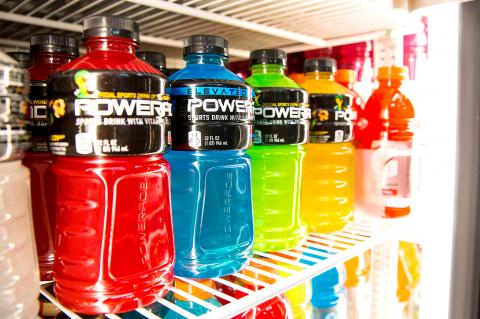Coca-Cola and PepsiCo said on Monday they are working to remove a controversial ingredient from all their drinks, including Mountain Dew, Fanta and Powerade.
The ingredient, called brominated vegetable oil (BVO), had been the target of petitions on Change.org by a Mississippi teenager who wanted it out of PepsiCo’s Gatorade and Coca-Cola’s Powerade.
In her petitions, Sarah Kavanagh said that the ingredient has been patented as a flame retardant and is not approved for use in Japan and the EU.

Photo: AFP
Coca-Cola and PepsiCo have stood by the safety of the ingredient, which is used to distribute flavors more evenly in fruit-flavored drinks.
However, their decisions reflect the pressure companies are facing as people pay closer attention to ingredient labels and try to stick to diets they feel are natural. Several major food makers have recently changed their recipes to remove chemicals or dyes that people find objectionable.
While food companies stress that the ingredients meet regulatory requirements, their decisions reflect how marketing a product as “natural” has become priority and a competitive advantage.
PepsiCo had said last year that it would remove brominated vegetable oil from Gatorade. On Monday, the company said it has since been working to remove it from the rest of its products. PepsiCo also uses BVO in its Mountain Dew and Amp energy drinks.
The company, based in Purchase, New York, did not provide a timeline for when it expects the removal to be complete.
Earlier on Monday, Coca-Cola had also said that it is removing the ingredient from all its drinks to be consistent in the ingredients it uses around the world. In addition to Powerade, Coca-Cola uses BVO in some flavors of Fanta, Fresca and several citrus-flavored fountain drinks.
The company said BVO should be phased out in the US by the end of the year.
Coca-Cola said it would instead use sucrose acetate isobutyrate, which it said has been used in drinks for more than 14 years, and glycerol ester of rosin, which it said is commonly found in chewing gum and drinks.
A Coca-Cola spokesman, Josh Gold, said that BVO is not used in many other countries, but said it would be phased out in Canada and Latin America as well.
The Center for Science in the Public Interest, a health advocacy group, said that the Food and Drug Administration permitted the use of BVO on an interim basis in 1970 pending additional study. Decades later, the group said that BVO is still on the interim list.
Kavanagh, the Mississippi 17-year-old, had been planning on launching another petition on Change.org asking PepsiCo to remove BVO from all its drinks. She was not immediately available for comment late on Monday.
However, earlier in the day she said: “It’s really good to know that companies, especially big companies, are listening to consumers.”

Meta Platforms Inc offered US$100 million bonuses to OpenAI employees in an unsuccessful bid to poach the ChatGPT maker’s talent and strengthen its own generative artificial intelligence (AI) teams, OpenAI CEO Sam Altman has said. Facebook’s parent company — a competitor of OpenAI — also offered “giant” annual salaries exceeding US$100 million to OpenAI staffers, Altman said in an interview on the Uncapped with Jack Altman podcast released on Tuesday. “It is crazy,” Sam Altman told his brother Jack in the interview. “I’m really happy that at least so far none of our best people have decided to take them

BYPASSING CHINA TARIFFS: In the first five months of this year, Foxconn sent US$4.4bn of iPhones to the US from India, compared with US$3.7bn in the whole of last year Nearly all the iPhones exported by Foxconn Technology Group (富士康科技集團) from India went to the US between March and last month, customs data showed, far above last year’s average of 50 percent and a clear sign of Apple Inc’s efforts to bypass high US tariffs imposed on China. The numbers, being reported by Reuters for the first time, show that Apple has realigned its India exports to almost exclusively serve the US market, when previously the devices were more widely distributed to nations including the Netherlands and the Czech Republic. During March to last month, Foxconn, known as Hon Hai Precision Industry

PLANS: MSI is also planning to upgrade its service center in the Netherlands Micro-Star International Co (MSI, 微星) yesterday said it plans to set up a server assembly line at its Poland service center this year at the earliest. The computer and peripherals manufacturer expects that the new server assembly line would shorten transportation times in shipments to European countries, a company spokesperson told the Taipei Times by telephone. MSI manufactures motherboards, graphics cards, notebook computers, servers, optical storage devices and communication devices. The company operates plants in Taiwan and China, and runs a global network of service centers. The company is also considering upgrading its service center in the Netherlands into a

Taiwan’s property market is entering a freeze, with mortgage activity across the nation’s six largest cities plummeting in the first quarter, H&B Realty Co (住商不動產) said yesterday, citing mounting pressure on housing demand amid tighter lending rules and regulatory curbs. Mortgage applications in Taipei, New Taipei City, Taoyuan, Taichung, Tainan and Kaohsiung totaled 28,078 from January to March, a sharp 36.3 percent decline from 44,082 in the same period last year, the nation’s largest real-estate brokerage by franchise said, citing data from the Joint Credit Information Center (JCIC, 聯徵中心). “The simultaneous decline across all six cities reflects just how drastically the market